Peter MALONE
Saturday, 18 September 2021 20:01
Beginner's Guide to Endings, A
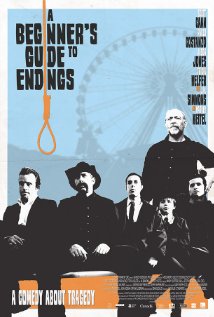
A BEGINNERS GUIDE TO ENDINGS
Canada, 2010, 93 minutes, Colour.
Harvey Keitel, Scott Caan, J.K.Simmons, Paulo Costanzo, Jason Jones, Jared Keeso, Tricia Helfer, Wendy Crewson, Stephen Mc Hattie, James Preston Rogers, Siam Yu.
Directed by Jonathan Sobol.
The invitation is to pay attention to the title of this film, the emphasis on endings – and death – and beginner’s luck and lack of luck concerning death.
Harvey Keitel’s initial voice-over tells us of his impending death – and then the revelation that his four sons, from various mothers, have little time to live. In their childhood, he contracted to get some money by making them participate in a medical experiment, taking tablets, which means that they have a limited lifetime.
The film is mainly about the brothers, each eccentric in their own way, life at home, interactions, careers, especially in boxing, relationships…
With all these ups and downs, they finally discover, as, perhaps, they always should have known, that their mother did not agree with the medical experiment and substituted harmless tablets instead of those prescribed.
A lot of the comedy is tongue-in-cheek, sometimes broad, some moments of subtlety, a Canadian entertainment.
1. The title, comic, expectations?
2. Knowing a greater, homes, jobs, church, pipes and experiments? The musical score?
3. Duke, his voice-over, his story, his bad life, the explanation of each son, the different mothers, his comments on each? Going to die? His narration, the pork, the Roebuck and the log, the different attempts, his reminiscing, his requests? Arriving in Viagra, the two weeks, the irony is, saving Jacob, going over the falls? Dying happy?
4. His will, the gathering in the church, uncle Pal? Cal arriving late, banking up the woman, the fight, Nuts explaining how to punch? The gathering afterwards, the drinking, the letter, the news about the pills and the experiment, their impending deaths?
5. The flashbacks, Duke and his arrangement with the company, the pills, putting them in the fridge? His taking the money, the flashbacks showing him gambling it all away? The small amount left in the bequests?
6. The irony of their mother, telling that they were not dying, the fact that she substituted the pills for peppermints?
7. The Brothers, interactions amongst themselves, in the house?
8. Nuts, boxer, his failures, the clashes with the brothers, using Juice box, with the manager, the deals, his brother having to fight, seeing the champion, his fears, his conscience and his taking his place, going into the ring, the electricity blackout, knocking at the champion, winning? And his throwing syllabi at the window and hitting big Mitch?
9. Jacob, about to die, his holding a job, making a bucket list, sharing it with his brother? During the opposite in his life, the car, the tenant to and it paying, diving, the collage of all his activities, the humorous sequence and his talking to the girl about his smile and her smile? 19 on the preparation, in the container, his mother trying to stop him, stuck in the container, snagged on the branch and his being rescued?
10. Cal, the womaniser, the troubles, his deciding to reform because he was dying, the plan to see Miranda, not having seen her since school, the three husbands, travelling, finding her, her happiness in seeing him, going to the bar, Big Mitch, the challenge, the wood and nails, Mitch and the silver bar hitting him, the train tracks, trying to break the handcuff, cutting off his hand? His being a good sport? Cal and his coming to his senses?
11. Juice box, slow witted, with the brothers, going to fight, preparations, seeing the champion, the years ?
12. Little boy, sensible, all the activities, his funny remarks, sharing with Jacob?
13. The mother, coming to their rescue, the happy household at the end?
14. Importance of all coincidences, all coming together, the humour, saving the brothers, and a happy ending?
Published in Movie Reviews
Published in
Movie Reviews
Tagged under
Saturday, 18 September 2021 20:01
City State/ Borgriki
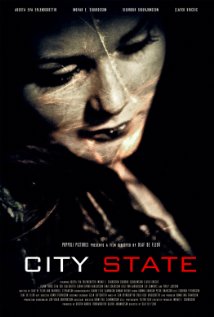
CITY STATE/ BORGRIKI
Iceland, 2011, 87 minutes, Colour.
Zlatko Krickic, Agusta Eva Erlendsdottir, Ingvar Eggert Sigurasson, Siguraur Sigurjonsson, Bjorn Thors.
Directed by Olaf de Fleur.
City State is quite a grim thriller, set in contemporary Reykjavik, with quality number of strands interconnecting.
A Serb man is distraught when his unborn child is killed. A policewoman is caught up investigations. The drug scene in Iceland is experiencing a takeover from foreign criminals. And there are local corrupt police.
The film is edited like an American thriller, different time periods, each making comment on the other, an unpleasant picture of what international drug crime can do to individuals, groups and a culture.
Representatives of the foreign drug dealers are played by Jonathan Pryce and Philip Jackson.
1. Europeans story, the Iceland setting? Production?
2. The settings, the city, homes, garages, restaurants, offices? Authentic feel? The score?
3. The title?
4. The world of crime, police, corruption?
5. Sergei, his Serbian background, in Iceland, the deals, the garage, the various thugs, hiding the drugs, the threat to his wife, the life,
her miscarriage, in hospital, his motivations for action, the fellow Serbs, the confrontation with gun, with the police? Threats and violence?
6. The police, the leader and Andrea, the effect, the wife, being thrown from the balcony, surviving, in hospital, the two women? His continued pursuit?
7. Ingolfur and his role, with Sergei, the garage, the further confrontations, the thugs, getting out, the confrontation?
8. Gunnar in himself, his business, the English partner and his giving up, the outsider, the temptation of his bids? Gunnar, his health, collapse? Ingolfur and Sergei, revenge?
9. The police chief, deals, data the clubs, the prostitutes, his corruption, arranging evidence, the challenge from Gunnar?
10. The range of characters, situations – and an ugly environment picture of the city state?
Published in Movie Reviews
Published in
Movie Reviews
Tagged under
Saturday, 18 September 2021 20:01
Oliver Twist/ 1997
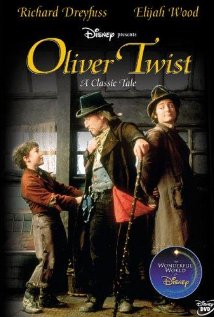
OLIVER TWIST
US/Ireland, 1997, 91 minutes, Colour.
Richard Dreyfuss, Elijah Wood, David O' Hara, Alex Trench, Antoine Byrne, Olivia Caffrey, Anthony Finnigan, Maria Charles.
Directed by Tony Bill.
This Disney version of Oliver Twist was made for television, filming in Ireland and directed by actor-director, Tony Bill.
It recreates the familiar story, classically filled in 1948 by David Lean with Alec Guinness as Fagin. Soon after this film, he was to be played by Ben Kingsley, directed by Roman Polanski. Oliver is played by Alex Trench, whose only film this is. The part of Bill Sykes is played by David O’ Hara and, surprisingly, The Artful Dodger is played by Elijah Wood.
The film re-creates the North of England as well as London, with some lavish sets, costumes and decor. A number of commentators considered that the film was too bright-looking, a touch sugary, owing much to the musical will film version, Oliver.
1. The popularity of Dickens’ tale? The many film versions? Classics, the musical, Oliver? A variety of versions for television and cinema?
2. This production from Disney? The abbreviation of the story? Inclusions and omissions? An adaptation of details, differing from the novel?
3. The film made in Ireland, the re-creation of the North of England, the workhouse, London, the markets, the squalid areas, Grosvenor Square and its affluence, genteel? The musical score?
4. The bright colours of the film, the tone, reminiscences of Oliver – and audiences, perhaps, anticipating the characters to move into song?
5. The opening, the pregnant mother, giving birth, the hard attitudes of the authorities? Her locket and portrait? The widow taking care of it?
6. Oliver at six, the workhouse, hard work, the hard grind, the laundry? The widow and her attitudes? Oliver wanting to see the locket?
7. Oliver at 12, the continued hard work, the other orphans, the scene with Oliver asking for more? Punishments? Oliver as a strong character, demanding, wanting the locket, the refusal? His being ousted, the decision to return, taking the locket?
8. Oliver in London, wandering, the encounter with Dodger, his friendship, support, Oliver hungry, taking him to Fagin, Fagin liking him? The other boys? Bill and his being threatening? Nancy and her friendship?
9. The character of Fagin, the Jewish emphasis, Richard Dreyfuss’ interpretation? Friendly, sinister, his control of the boys, sending them out, their picking pockets, bringing money back, watches and jewels, Bill Sykes and his wanting his cut? Fagin and his secret box, Oliver seeing it, Fagin swearing him to silence, the threats? The lesson where Oliver had to pick the pocket and the handkerchief?
10. Dodger, his age, with the other boys, self-confidence, Fagin previously being betrayed by the boy, the boy going to jail, Dodger’s explanation of the jail and the opportunity to learn all the techniques of stealing?
11. In the street, the illustration of pickpocketing, kind people in the park, giving money even while being robbed? Oliver, the situation, his being caught, taken to the judge? Dodger reassuring Fagin that Oliver would not peach?
12. Mr Brownlow, Rose, compassion for Oliver, the appeal to the harsh judge, his going to the Brownlow house, Grosvenor square, clothes, food, the week?
13. Mr Brownlow entrusting Oliver with the books, the money, Oliver not returning, Mr Brownlow losing trust? Nancy’s visit, the reassurance, hoping to get Oliver back? Realising that Oliver was his daughter’s son?
14. Bill and Fagin, wanting Oliver back, Nancy snaring him, Fagin and his fears, Oliver and his reassurance, but wanting his locket back from Fagin?
15. Bill Sykes, the menace, the midnight rendezvous, his killing Nancy? Mr Brownlow and Rose at the Bridge? Bill with Oliver on the roof? The menace, the police, the crowds? Bill and his fall and death? The rescue of Oliver?
16. Oliver’s happy future? Dodger and his helping Oliver – and willing to go to jail?
17. Fagin and his confrontation with Bill, the jewels, Bill hitting him – but his surviving?
Published in Movie Reviews
Published in
Movie Reviews
Tagged under
Saturday, 18 September 2021 20:01
Hard Drive
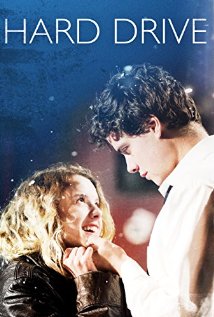
HARD DRIVE
Canada, 2014, 90 minutes, Colour.
Douglas Smith, Laura Wiggins, Megan Follows, Jerry Granelli.
Directed by William D. Mac Gillivray.
Hard Drive is a small film from director William D.Mac Gillivray who made the interesting small-budget films Life Classes and Understanding Bliss in the late 1980s. After that he made a number of documentaries, with a return to features with this film.
Set in a Canadian city, it focuses on young 23-year-old man and his mother, she very possessive of her son, he rather inexperienced but with a love of music and influenced by his mother’s border, a famous musician. The film also focuses on a young woman, some mysterious background, who travels to the city, locates herself in an apartment across the street, encounters a young man who welcomes her. His mother becomes suspicious of the girl and the relationship. The young woman encourages him to a great freedom, initiating him sexually.
She has a secret, especially with a laptop computer which has significant information, images of the father and she and the young man go to confront him, with dramatic results, death and the court case.
It is well acted – but the film had a limited release, arthouse cinemas and specialist television screenings.
1. A brief character study? Relationships? Family? Mentor?
2. The Nova Scotia setting, the town, homes, the open road, the winter season?
3. The musical score, the background of past songs, the drumming?
4. The title? Ditch and driving? The hard drive in Debs’ computer, Ditch taking it out? Debs posting it to the police?
5. The character of Ditch? His age, personality, relationship with his mother, the tensions, his absent father, his father a musician and
his inheriting rhythms, his mother being irritated with him, his drumming at the table, his clothes, the coat? His job, collecting the papers, taking them to the tip, collecting his money? The girl at the desk, taking her out with friends, the club, his drinking, the drumming, the fight? Debs and her intervening?
6. Debs, on the bus, no background, going into the room, observing Ditch, saving him at the club? Discussions, support, driving, friendship, Ditch as her first friend? Moving in, the relationship? The photos, the computer, at home with Ditch? The sexual experiences? The reaction of Ditch’s mother, her wanting Debs out?
7. The character of Knudsen? An old man, boarding, his love of the drums, playing, encouraging Ditch? His collapse and death?
8. Barbara, abandoned by her husband, saying she had thrown the postcard away, finally giving it to Ditch? Her work, the computer, possessive of her son while scolding him? Wanting Debs out? Ditch and his decision to leave? Her regrets?
9. Ditch, with Debs, looking at the computer? Debs revealing the sexual abuse by her father? On the computer, the visuals? The revelation of his abuse from the time she was 13, then filming, sending out the videos?
10. Ditch and Debs travelling, the confrontation with her father, the gun, giving him the computer?
11. The irony of Ditch taking out the hard to drive? Posting it to the police? The headlines on the newspaper, his being charged? Debs and her decision to return to see the case out? Saying Ditch was her only friend?
12. The effect of this experience on Ditch, a future, returning home or not, his mother, after the solution of the case and meeting Debs again?
Published in Movie Reviews
Published in
Movie Reviews
Tagged under
Saturday, 18 September 2021 20:01
Banger Sisters, The
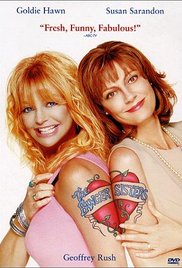
THE BANGER SISTERS
US, 2002, 98 minutes, Colour.
Goldie Hawn, Susan Sarandon, Geoffrey Rush, Erika Christensen, Robin Thomas, Eva Amurri.
Directed by Bob Dolman.
As a matter of historical interest, this was Goldie Hawn’s last film. She had been a star for more than 40 years, winning an Oscar for Cactus Flower in 1969. She had a strong career as a flighty blonde in such interesting films as Death Becomes Her and The First Wives’ Club.
Susan Sarandon had been acting for 40 years, a strong reputation for serious performances, but also with the light touch, especially with such films as Thelma and Louise, winning an Oscar in 1995 for Dead Man Walking as Sister Helen Prejean.
The story is slight, Goldie Hawn’s Suzette losing her job at a disco, deciding on a whim to visit her friend, Vinnie, in Phoenix, Arizona, teaming up with an author, played by Geoffrey Rush, on the way. While there is Goldie Hawn old-style tumour, there is the humour that Vinnie has become a very respectable citizen, Lavinia, married to a lawyer, with two children. Instead of the perhaps predictable clash between the two, what actually happens is that Vinnie goes down to the basement, discovers photos from the past, cuts her hair, puts on old clothes, goes out on the town with Suzette and transforms, much to the surprise of her husband and daughters.
An easy-going comedy relying on the talents of the stars.
1. A popular comedy, for older audiences, women’s audiences?
2. The strong cast, their careers, talent for drama, for comedy?
3. Los Angeles, the Whiskey a Go Go, on the road through California to Arizona? The city of Phoenix? Homes, city scenes, clubs? The musical score?
4. The presence of Goldie Hawn as Suzette, working at the Whiskey a Go Go club, being fired, stranded, her age, experience, her whim, to go to Phoenix, to be reunited with Vinnie, the groupies, the bands, the memories, the possibility for re-living the past? Driving, the encounter with Harry, the author, his story? In Phoenix, the encounter with Hannah, Harry’s hotel room, the drugs, Hannah being sick?
5. Going to see Vinnie, finding that she was Lavinia, the perfect mother and wife, her children saying she could never do and had never done anything wrong? Her husband, Raymond, the lawyer? Well-off, the spacious home, lifestyle? Husband and daughters?
6. The effect of Suzette’s presence? Vinnie going to the basement, the memories, as groupies, the photos, the stars’ penises? Her decision to let off steam, transform herself, cutting her hair, the clothes from the past, going out on the town, dancing, the effect of the night out? Her transformation?
7. The effect on Raymond, on the daughters – and herself? Her future?
8. Harry, the story about his father, his work, the hotel? The attraction to Suzette? Her becoming his muse and returning to Los Angeles with her?
Published in Movie Reviews
Published in
Movie Reviews
Tagged under
Saturday, 18 September 2021 20:01
Hot Tub Machine 2
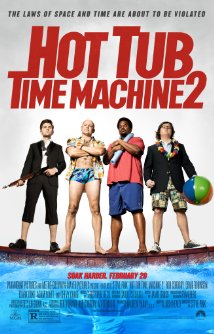
HOT TUB TIME MACHINE 2
US, 2015, 93 minutes, Colour.
Rob Corddry, Craig Robinson, Clark Duke, Adam Scott, Gillian Jacobs, Chevy Chase, Collette Wolfe.
Directed by Steve Pink.
Depends on how audiences responded to Hot Tub Time Machine, 2010. Many fans did not take well to this sequel.
With John Cusack absent, the focus of attention is on Lou, played by Rob Corrdry, no holds fields barred on sex jokes and innuendo. Craig Robinson is present again as his musical friend, exploited by Lou, Nick. And then there is Lou’s son, Jacob, young and ungainly and put upon by the others, played by Clark Duke, but moving, in the future, to be as much like his father as possible.
With ego flying, Lou makes himself the centre of attention but there is an attempt on his life, his being shot in his genitals – more jokes… The group decide to go into the future, getting the help of Chevy Chase. The future they find themselves in is vaguely familiar, television shows only more futuristic… And they encounter Adam’s son, played by Adam Scott. He seems agreeable enough, is about to get married, but has his own problems – including a psychedelic drug experience. However, there are difficulties with Lou.
And back they all go to thwart the attempt on Lou, only to find that it is Adam’s son who is the would-be assassin.
Men playing adult boys, with jokes mainly geared towards men responding as boys.
Published in Movie Reviews
Published in
Movie Reviews
Tagged under
Saturday, 18 September 2021 20:01
Leisure Class, The
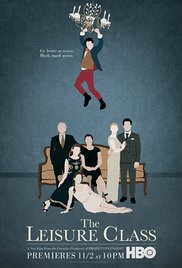
THE LEISURE CLASS
US, 2015, 86 minutes, Colour.
Ed Weeks, Tom Bell, Bridget Regan, Scottie Thompson, Bruce Davison, Brenda Strong.
Directed by Jason Mann.
The Leisure Class has interesting credentials, producers including Matt Damon and the Farrelly Bros, a Project Greenlight film.
The setting is Connecticut, a wealthy family estate of the Senator, Bruce Davison, celebrating the engagement of his daughter, Bridget Reagan, to William, a British financier, Ed Weeks. All seems to be going well on the surface, an elaborate affair with many high society and political visitors present.
Into the celebrations comes William’s brother, played very eccentrically by Tom Bell, who interrupts the occasion with his outlandish behaviour, the unmasking of William as a British conman, after the family’s money. The younger daughter of the family decides to play along with the intruder.
This is one of those films where a lot of truths are revealed by angry characters, the Senator, especially, revealed as a harsh man, down on his inherited finances, eager for a successful marriage. William gets involved in his fiancee’s reckless behaviour and drinking and tries to rescue her. This leads to many scenes of confrontation, bitterness, and, instead of a happy resolution, the daughter herself, influenced by her sister had been long alienated from the father, making a business arrangement marriage to thwart her father.
While some have billrd it as a comedy, it is not such a funny film but rather sardonic and satirical in its perspective on the business world, the world of the wealthy, the political world.
1. A small film, Project Greenlight experiment’s, HBO? The producers: an applicant for the Greenlight Project, Matt Damon, Farrelly Brothers?
2. The Connecticut settings, the mansion and grounds, the wealthy class? The political background and atmosphere? The opening party, the preparations for the wedding? Lavish costumes, decor? The musical score?
3. The credibility of the story on characters, the Langstons and their heritage, the pressure of the heritage, the railroads and wealth, positions in politics, the Senate? Langston having no son, the effect, his attitude towards his daughters, politically for his daughter? His anger, driving Allison away, on the surface, cultivating links, beneath the surface?
4. Fiona, nice, her decision about politics, daddy’s girl, meeting with Charles, engaged, the plans to marry, so quickly? At the party, socialising, the campaign issues?
5. Charles, from the UK, his alleged background, Eton and education? Pleasant, a trophy husband for the Langstons, his becoming involved, in love with Fiona, attitude towards her parents, his behaviour at the party?
6. The arrival of Leonard, the secret brother, his behaviour, reckless, childish, an alleged free spirit? Confronting Charles, the revelation that he was William? William wanting him to be Dean, school friend, the discussions, Leonard always taking over, with the family, the talk about the Charities? His clothes, manner, Caroline and her immediate infatuation? The discussions with William, the cash offer to go, accepting, changing his mind, staying? In the room, locked, the key, Caroline helping to him to get out, the drinks and the Langston safe, the raid, driving off to the party, his rousing up the guests, all in the pool?
7. Caroline, young, inexperienced, wanting to be sexy, infatuated with Dean? Dean and the later arrival of a prostitute, her place, remarks, Caroline’s response?
8. Allison, lawyer, being away, returning home for the wedding, her cold manner, the importance of documents, her wanting to investigate Charles? Going to the party? Observing? Fiona, the reaction, going to the party, trying to save her father’s reputation, not going into the pool, the challenge, her going you?
9. Charles, waking, the reaction of the butler, his acting like Fiona’s father, taking away from the party, his being shocked? The reckless driving, the crash, the ambulance, Langston coming, the cover-up, not wanting any scandals because of the politics?
10. The revelation of the truth, Ted and his drinking, making Leonard strip, whipping him? His long speech, about the heritage, despair? The negative reaction of his wife, his daughters?
11. Leonard deciding to go – and William wanting him to stay?
12. Fiona, discovering her hold over her father, William packing, his decision to go through with the wedding?
13. The wedding going on, all the surfaces and seeming respectability? What future?
14. American society, the role of the British, wealth, fraud, politics, cover-ups? And the touches of satire?
Published in Movie Reviews
Published in
Movie Reviews
Tagged under
Saturday, 18 September 2021 20:01
Having You
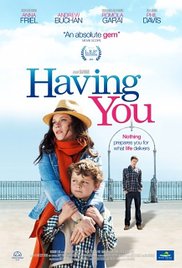
HAVING YOU
UK, 2013, 92 minutes, Colour.
Anna Friel, Andrew Buchan, Romola Garai, Phil Davis, Isaac Andrews, Stephen Cree, Harry Hadden- Paton, Hattie Morahan.
Directed by Sam Hoare.
Having You Seems a rather slight title for the interesting and emotional drama that unfolds.
We are introduced to Anna, Anna Friel, a rather distraught mother, a psychic, making phone calls, moving house, with a young son, Phoenix, Isaac Andrews. Then we are introduced to a seemingly happy couple, together nine years, Jack, Andrew Buchan, and Camilla, Romola Garai (who is married to the film’s director, Sam Hoare). All seems well with them, not having contemplated marriage but on a visit to Camilla’s pregnant friend and jibes from her husband, Jack gets the idea of proposing – and a weeping Camilla in the restaurant accepts.
The drama intensifies when Anna visits Jack with her young son, talking of paternity, offering him kits for paternity tests, which he takes and discovers that the claim is true, a one night stand in the past when he was trying to overcome his alcoholism and Camilla had suffered a miscarriage. It seems that Camilla cannot conceive children but, in fact does, and is advised not to undergo any stress so Jack does not tell her the truth. In the meantime, he pays visits to Anna and the boy, gradually making friends with him.
When the boy is injured in the playground and Jack takes him to the hospital where Camilla works, the truth emerges and Camilla ousts Jack who tries to explain and apologise. He moves out, and continues his contact with the boy and with Anna. But, Anna has a secret, she is terminally ill, had wanted to introduce Jack to his son – and he promises to take care of him.
Phil Davis gives a strong performance as Jack’s demanding father.
While the screenplay does not fully bring the film to a tearfully happy ending, it suggests what is going to happen – positively.
A small film, quite affecting in its way.
1. A drama about relationships, commitment, children, illness and death? An emotional film?
2. The British settings, towns, homes, workplaces, hospitals, playgrounds, parks? The musical score?
3. The title – and its relevance for each of the characters and relationships?
4. The introduction to Anna, as a psychic, moving, her son, Phoenix, her love and care for him? On the phone? Her later entry into the story, her coming to see Jack, wary, her news, about her son, his paternity, their one night stand, her leaving him with the DNA paternity tests?
5. Jack and Camilla, together for nine years, living together, comfortably together, loving each other? the past? Jack and his being an alcoholic, reforming, seven years without a drink? The role of Camilla? The sadness of her miscarriage? Her sessions with the doctors, the tests, her “inhospitable womb”? Her work at the hospital?
6. Jack, seeing himself as a failure, the back story, his mother and her abandoning him and his father, his father bringing him up, the stern father, playing chess, feeling he disappointed his father, yet moving with Camilla to be near him and the father never visiting them? His work, his partnership with Paul, slot machines, videogames, repairs, sales and rent? His prospects, the visit with Barry and Lucy, Lucy’s pregnancy, discussions about marriage, the restaurant and his proposal, Camilla weeping, accepting?
7. Jack, the news, not telling Camilla, Camilla becoming pregnant, the warning for her not to have stress? His continued devotion to her? His work, eventually telling Paul? The visits with Anna and Phoenix, at home, tentative talking with the boy, playing with him, at the park, gradual trust? Anna and her observing?
8. Jack ignoring Anna’s phone calls, her visit to the house, seeing that Camilla was pregnant? Her challenge to Jack?
9. Jack, his indecision, discussions with Paul, the better prospects the job, getting an international contract, the money? The issue of Paul as best man – and Jack thinking him reckless? The visit to Barry and Lucy, Barry letting Jack know that he had seen the group at the aquarium? Barry, love for Lucy, but his sleazy attitude towards relationships and indiscretions, men being men? Jack disliking him? And yet Lucy promoting him for his expertise in preparing the wedding?
10. Jack, the visit to his father, the walk in the park? His father later visiting him, his harsh taunts, the bitterness towards his wife and her leaving, his self-sacrifice in daily work, providing for his son? Not answering about Jack being a disappointment? His bringing the bottle of alcohol, testing Jack, taunting him? The fact that he was an alcoholic, that he could never change? Jack, the temptation, going to Paul and Paul’s support, Jack inviting him to be best man?
11. The playground, the accident, taking Phoenix to the hospital, Camilla seeing the situation, being hurt, looking after the boy? Not wanting to discuss with Jack, ordering him to leave the house? His later return, Barry’s presence, her refusal?
12. Moving out, the flat? The decision to get another house, to provide for Phoenix? Phoenix visiting the house, the two and their time together, bonding? Jack’s explanation of his situation and the one night stand?
13. Anna’s collapse, the hospital, Camilla getting in touch with Jack, the terminal illness and her not telling people? Her wanting Jack to take her son, care for him? her wanting Phoenix to remember her as she was rather than as in the hospital and dying? The final visits, her writing the letter and her bequeathing her ideals and hopes to Phoenix?
14. Jack and Phoenix, acknowledging that he was the father, Phoenix accepting this?
15. The glimpse of Camilla and Jack together – and audience hopes for the future, together, marriage, adopting Phoenix, and Camilla giving birth to another child?
Published in Movie Reviews
Published in
Movie Reviews
Tagged under
Saturday, 18 September 2021 20:01
One Wild Moment/ Un moment d'egarement/ 2015

ONE WILD MOMENT/ UN MOMENT D’EGAREMENT
France, 105 minutes, 2015 Colour.
Vincent Cassel, François Cluzet, Lola Le Lann, Alice Isaaz.
Directed by Jean- François Richet.
One Wild Moment/ Un moment d’egarement is a remake of a 1977 film of the same title, directed by distinguished French director, Claude Berri (Jean de Florette and Manon of the Springs).
It is very French in its characters and in situations, especially concerning parents, fathers, the younger generation of teenage girls, sexuality – and both a sense of freedom in morals as well as a strictness in perspective.
Two a middle-aged fathers, one divorced. (Vincent Cassel), the other having difficulties with his wife and the possibility of separation (François Cluzet). They go to a resort in Corsica with their daughters, Cassel being more permissive concerning his daughter and her going out, Cluzet more concerned with control and curfews. The girls tend to go their own ways, going into the town, teaming up with boys, getting back late…
The main crux of the drama is the Lolita-like behaviour of Cluzet’s daughter, being provocative with Cassel, Is allowing himself to be seduced and compromised, his regrets and trying to remedy the situation, not informing his friend. However, Cluzet is dementedly suspicious, suspects a local who is, in fact, gay, and bashes him.
Quite a lot of dramatic tension, the daughter having a self-absorbed carefree attitude, putting herself in compromising situations. At the end, guilt is admitted, there is a clash – a sobering experience for Cassel and challenging parental crisis for Cluzet.
1. A French story, family, teenagers, generation differences, parenting, love and sexuality?
2. Corsica, the landscapes, the road, the sea, beaches, the house, climbing the cliffs? Country life? The contrast with socials, parties? The musical score?
3. Laurent and Antoine, their age, each with a daughter, divorced and married, separations, the house, climbing the cliffs? Issues of parenting, discipline?
4. Louna and Marie, their age, going out, not coming back as requested, on the scooters, the boys, drinking? The scaling the cliff, the swim, Lugar leaving her breast exposed, looking at Laurent, seductive? By themselves? Her contriving the situation to be alone with him, at the beach, coming on to him? His response? The sexual encounter? Marie and her realisation of what happened, antagonism towards Louna, towards her father? The girl talk?
5. Laurent, the effect on him? Unable to tell Antoine? Antoine, preoccupation with the boar, going to the shops, catalogues and his studying them? The gun, pursuing the boar?
6. Marie, intervening with Louna, seeing her going from the room, criticising her father, anger at Louna?
7. Antoine, his wife, the separation, his being unreasonable with her, her plans, going to Ibiza, going to the town, floating?
8. Louna and her discussions with her father, his perceptions, getting something of the truth from her, her reluctance? His discussions with Laurent, getting him to take his daughter out to the meal, the discussions, getting a result, the suggestion about asking the DJ, going to the clubs, Antoine drinking, anger, pursuing the DJ, in the fight in the toilet – and the man being gay?
9. The episode with the group playing cards, the mention of Laurent’s girlfriends from the past?
10. Louna, continually flirting, openly, lying with him, going to the bedroom, her wanting to say that he loved her, his continued saying he did not? His gradually accepting to say this under pressure?
11. The return, the death of the dog, burial, the friend, and chasing the boar?
12. Laurent telling Antoine the truth, anger, missing the boar?
13. Later, the reticence, and Antoine not revealing that he knew?
14. This experience for each in their own way? Louna and her falling in love, being seductive, unrepentant? Adolescent experience? The effect of the experience? Marie, having to grow, attitude towards her father? The two men, continued friendship with the memory of this experience?
Published in Movie Reviews
Published in
Movie Reviews
Tagged under
Saturday, 18 September 2021 20:00
Eden

EDEN
France, 2014, or 131 minutes, Colour.
Felix de Givry, Pauline Etienne, Vincent Magaigne, Hugo Conzelman, Zita Hanrot, Roman Kolinka, Vincent Lacoste, Greta Gerwig, Brady Corbett.
Directed by Mia Hansen- Love.
Eden is a semi-autobiographical film by celebrated French director, Mia Hansen- Love whose films included The Father of My Children, Goodbye, First Love, L’ Avenir. The screenplay was co-written with her brother, Sven Hansen- Love, on the the central character, Paul, is modelled – and his love of music, his work as a DJ, his physical and moral collapse with drugs, his commitment to the world of music, his recovery.
The film traces the French music world, rock, punk, garage, from the 1990s to the 2010s. It is principally a film for those interested in this music world and its extension to New York City at the end of the 1990s. There is quite a range of music played, a range of bands and individual musicians.
The film shows enthusiasm, but also shows a downward spiral, disappointments, relationships and breaking relationships, the world of drugs, the suicides.
While the film has a strong French cast, the American connections are reinforced by the presence of Greta Gerwig and Brady Corbett.
For those who admire this music scene and the director, but friends of the director might find the detailed focus on this music world somewhat alien at times.
1. The contemporary music in France from the 1990s to 2010? The trends? The different styles of music? Performance, DJs, composers, bands and instruments, venues for playing? France, Paris, New York?
2. The director, films? The memories of her childhood? Collaborating in writing the screenplay with her brother as the model for the character, Paul?
3. The range of songs played throughout the film?
4. France in the 1990s, young adults, work, music, bands and nightclubs, drink and the prevalence of drugs? The effect at the time?
5. Paul, based on the director’s brother, his home, with his mother (and asking for money later, acknowledging his addiction, his mother’s response)? His work, writing? His interest in music? His work as a DJ, skills, the music, enjoyment, the musicians? His collaboration with his friends? The collaboration with Stan and the formation of Cheers? His collaboration with Guy- Man, Thomas? The progress throughout the 1990s? His relationship with Louise? The relationship and momentum, breaking up, the return to New York? Later meeting her, the meeting with Larry, the story of her abortion?
6. Invitation to go to New York, the invitation to Cyril, his staying in France, concentrating on his comic and design? The shock of his suicide?
7. The impact on Paul, his return to France, collapse, with his mother? The meeting with the young girl, the comments about the music she listened to? His being part of the past? His new job, salesmen? The night courses?
8. The range of people in the music industries? France and the US? Fashions, tastes, “garage” music, punk, and its varieties?
9. Paul, his character – and his being saved in real life, the director’s brother and his music, collaboration with the sister of the screenplay, able to take stock of his life?
Published in Movie Reviews
Published in
Movie Reviews
Tagged under